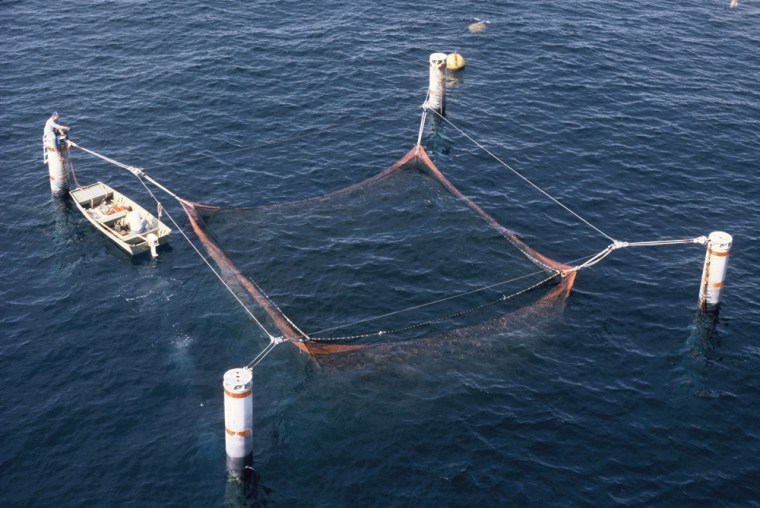Offshore fish farming would be allowed in the Gulf of Mexico under a plan approved Wednesday by the agency that sets the body of water's fishing rules.
Fishermen complained that making the Gulf the first federal waters off the U.S. to allow the farming would cause pollution and drive them out of business. Supporters, though, say the farming would give the country a bigger piece of a multibillion-dollar industry.
The Gulf of Mexico Fishery Management Council voted 11-to-5 in favor of allowing the farming. One member involved in aquaculture research abstained. The U.S. Commerce Department has final say on the rules.
Those against the plan claimed the large cages and pens that would raise fish far offshore would pollute the oceans with fish waste and chemicals. Farmed fish, which often get heavy doses of antibiotics, can also escape into the wild and interfere with native species.
"We simply do not want this," Avery Bates, vice president of the Organized Seafood Association of Alabama, told the council before the vote. "Do not allow this, I don't care who's pushing your buttons ... Don't put us out of business."
Bates, who represents about 200 commercial fishermen in Alabama, said there was fear that foreign companies would buy permits to farm fish offshore and then sell the fish at reduced prices, undercutting U.S. fishermen.
George Leonard, director Ocean Conservancy's aquaculture program, called the vote "a dangerous precedent" since federal standards for large fish farms are lacking.
"Without a precautionary approach including overarching environmental, socio-economic, and liability standards the council is putting much of the Gulf’s ecological and economic foundation at risk as well as the progress that the council has made in restoring wild caught stocks such as red snapper," he added.
Harlon Pearce, a council board member, said farming would create jobs for struggling fishermen. Fishermen, he said, "have been over-regulated to death and we don't have enough wild production because of regulatory problems."
80 percent of U.S. seafood imported
The United States takes in about $10 billion in seafood imports a year and exports only about $2.7 billion, according to data from the Commerce Department. About 80 percent of all seafood consumed in the United States is imported.
Commercial seafood company owner John D. Ericsson favors the plan. He said the United States has fallen behind countries like Greece, Norway and Chile, where offshore farming has taken off.
Board member Pearce agreed, saying it was time for the United States to "catch up with the rest of the world." Some states do allow fish farming close to shore.
Ericsson said his company, Florida-based BioMarine Technologies Inc., is looking at growing fish in cages that could contain up to 60,000 cobia, also known as king fish in the Northeast, and amberjack. He said it would take about $10 million to set up an offshore fish farm.
"It's a serious business commitment," he said.
Besides creating jobs, fish farming is important for the nation's food security, he said. "Just think if someone was able to wipe out our cows and other land creatures with an anthrax. Where would we get our protein from?" he said.
Supporters of farms estimate that it would take only 2,000 acres of fish farms in the Gulf to match the amount of fish caught every year in the wild, but sport and commercial fishermen lined up against the plan being considered by the Gulf of Mexico Fishery Management Council, which sets fishing rules.
Commerce Dept. has final say
The offshore farming plan still needs final approval from the Commerce Department, which hasn't taken a position yet. The earliest Commerce could weigh in would be three months from now, after a comment period.
Charter boat fishermen also were opposed, saying it would limit the fishing waters, said Bob Zales II, the executive director of the Conservation Cooperative of Gulf Fishermen.
"They're going to take an area and put their cages there and I can't fish there anymore," Zales said.
Fish farming has so far been limited close to shore, but the Gulf council's proposal would establish sweeping regulation that would open up waters far offshore.
Former President George W. Bush's administration pushed for opening U.S. waters to fish farming and succeeded in drawing support for the idea.
Opponents said after Wednesday night's setback they were hopeful the new Obama administration would see the issue differently.
"The (Obama) administration is dedicated to protecting the marine environment and I hope it says, 'Not on my watch,'" said Zach Corrigan, a staff attorney with the Food & Water Watch, a Washington-based group that fought offshore fish farming.
In the Gulf, there is interest in transforming unused offshore oil and natural gas platforms into fish farms. Some oil companies have experimented with platforms to anchor underwater pens. The platforms themselves could store feed and house farmers.
But critics say oil companies are looking for ways to avoid the costly removal of platforms that are longer used.
